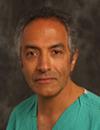Professor Baljean Dhillon
NES Chair of Clinical Ophthalmology

- Centre for Clinical Brain Sciences
- Division of Health Sciences
- NHS Lothian
Contact details
- Tel: +44 (0)131 536 3901
- Email: baljean.dhillon@ed.ac.uk
Background
- Childhood and school in Leicester, graduated from Nottingham University Medical School
- Junior house officer posts in renal medicine and neurosurgery and ophthalmology training in Plymouth, London, Singapore and Edinburgh
- Appointed Consultant 1991, specialising in cataract surgery and medical retina diseases
Postgraduate teaching
The ChM Clinical Ophthalmology has been designed to support, supplement and advance clinical learning, develop clinical research skills and provide a platform from which ophthalmologists in training are mentored during this 2 year distance learning postgraduate programme.
The format of our ChM course delivery incorporates a multimedia mix of teaching tools including asynchronous discussion boards, video lectures, virtual clinics and e-portfolio reflective diaries. The international teaching Faculty has the experience and expertise to deliver clinically-relevant content across the range of medical and surgical ophthalmology to a global studentship.
The Faculty are mindful of the varied culture, climate and geographic contexts in which students practice ophthalmology and the limitations in resources available in less affluent settings. This has shaped the way in which didactic and discursive topics are prioritised and practiced within the virtual learning environment and is one of the unique features of the ChM Clinical Ophthalmology.
Research summary
The retina is the only site in the human body where we can make direct observations of our smallest blood vessels and capillaries within specialised neural tissue. This neurovascular tissue is derived from our brains during development.
The eye’s unique accessibility allows us to study the neurovascular links and common mechanisms giving rise to eye and brain disease. Identification of changes in the neuroretina to predict parallel processes in central nervous system tissue allows the eye to be used as both a window to, and barometer of brain change in neurodegenerative diseases.
Research aims and interests
The purpose of CCBS eye research is to explore how the signs of dysfunction and disease in the eye might yield valuable insight into parallel processes occurring in the brain.
Specifically we plan to utilise advanced imaging tools to dissect and interrogate ocular tissues to test the hypothesis that neurovascular disease detectable in the eye mirrors brain change in chronic neurological disease.
This links to research interests in the common and blinding neurodegenerative disorders affecting the eye, namely glaucoma and macular degeneration which are the focus of our studies of ocular imaging, genetics, stem cell research and visual rehabilitation.
Research group members
- Dr Andrew Tatham, NRS Fellow and Consultant Ophthalmologist
- Dr Roshini Sanders, Consultant Ophthalmologist and Hon. Senior Lecturer
- Dr Shyamanga Borooah, PhD student
- Dr Ian MacCormick, Ophthalmologist and PhD student
- Dr James Cameron, PhD student
- Mr Howard Moshtael, EngD student
- Ms Josie Grant, PhD student
- Mr Tom Pearson, PhD student
- Ms Ellie Brown, Research Assistant
Collaborators
- Professor Siddharthan Chandran, University of Edinburgh
- Professor Peter Aspinall, Heriot Watt University
- Professor Ian Underwood, University of Edinburgh
- Professor Manuel Trucco, University of Dundee
- Professor Marc Turner, Scottish National Blood Transfusion Service
- Professor Rory Duncan, Heriot Watt University
- Professor Tariq Aslam, University of Manchester
- Dr Tom MacGillivray, University of Edinburgh
- Professor Jim Ross, University of Edinburgh
- Professor Ian Deary, University of Edinburgh
Sources of funding
- UK Stem Cell Foundation
- Scottish Enterprise
- Medical Research Council (CASE and Confidence in Concept)
- Royal College of Surgeons
- Chief Scientist Office
- Edinburgh and Lothians Health Foundation
Related links
Clinical research & trials at the Centre for Clinical Brain Sciences
Neuroimaging research at the Centre for Clinical Brain Sciences
-
Optometrists' Perspectives Regarding Artificial Intelligence Aids and Contributing Retinal Images to a Repository: Web-Based Interview Study
In:
JMIR Human Factors, vol. 10, pp. 1-9
DOI: https://doi.org/10.2196/40887
Research output: Contribution to Journal › Article (E-pub ahead of print) -
Anterior segment phenotypic changes in late-onset retinal degeneration with Ser163Arg mutation in CTRP5/C1QTNF5
In:
Graefe's archive for clinical and experimental ophthalmology = Albrecht von Graefes Archiv fur klinische und experimentelle Ophthalmologie
DOI: https://doi.org/10.1007/s00417-023-06041-0
Research output: Contribution to Journal › Article (E-pub ahead of print) -
Corrigendum to "Novel retinal vascular phenotypes for the potential assessment of long-term risk in living kidney donors." Kidney Int. 2022;102:661-665
(2 pages)
In:
Kidney International, vol. 103, pp. 429-430
DOI: https://doi.org/10.1016/j.kint.2022.12.001
Research output: Contribution to Journal › Article (Published) -
Retinal Vascular Changes in Alzheimer's Dementia and Mild Cognitive Impairment: A Pilot Study Using Ultra-Widefield Imaging
In:
Translational Vision Science & Technology, vol. 12, pp. 13
DOI: https://doi.org/10.1167/tvst.12.1.13
Research output: Contribution to Journal › Article (Published) -
Multi-modal retinal scanning to measure retinal thickness and peripheral blood vessels in multiple sclerosis
In:
Scientific Reports, vol. 12, pp. 20472
DOI: https://doi.org/10.1038/s41598-022-24312-4
Research output: Contribution to Journal › Article (Published)
